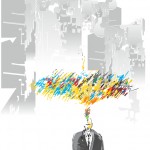
“Pure-O” or “Pure Obsessional” is a term often found on the web and in parlance with some health care professionals. Historically it was a term that emerged to describe a subset of OCD sufferers who seemed on evaluation to have obsessions (intrusive thoughts, images, and impulses causing distress) but no compulsions/rituals (mental or behavioral actions performed to reduce the distress caused by obsessions). We often get calls from people with OCD self-designating themselves as suffering from “Pure-O.”
More recently the term has evolved to describe those who do not seem to have overt behavioral compulsions (like hand-washing, checking, etc.), but primarily engage in mental rituals. In fact, the most recent research tends to suggest that having only obsessions with no rituals is quite rare. Inevitably we find that somehow a person having obsessions and associated distress are doing something to get rid of it (or at least lower the distress to “manageable” levels). Mental compulsions can include rationalizing self-talk, reassuring oneself, special words or phrases repeated mentally (e.g. “I’m okay, I’m okay”), mental reviewing (of conversations, events, etc. to ensure nothing “bad” happened), and mental counting (counting to prevent something bad from happening).
Exposure and Response Prevention (ERP) has been shown to be just as successful treating “Pure-O” as other manifestations of OCD. A critical component of successful treatment is for you and your therapist to identify anything you might be doing (or not doing) either in your behaviors or in your head to try and respond to the intrusive obsessional fears and reduce the associated distress/anxiety. These rituals, along with your obsessions, will be specific targets of treatment.